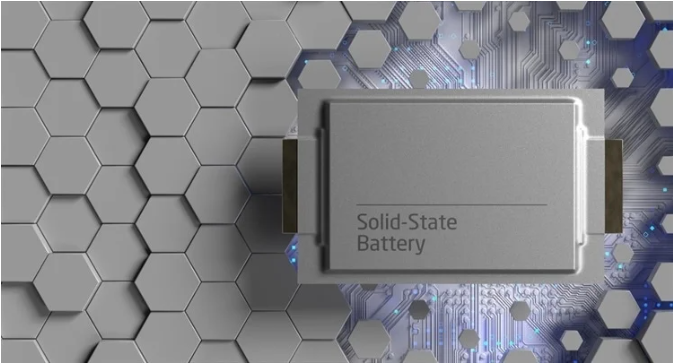Electric vehicles are gaining popularity as the world searches for more eco-friendly transportation options. The battery is a fundamental component of any electric vehicle, and solid-state batteries are now seen as a potential game changer in this industry. They offer more energy capacity, charge faster than lithium-ion batteries, and reduce electric vehicle carbon footprint by 40%.
Image Credit: JLStock/Shutterstock.com
What is a Solid-State Battery and What Sets them Apart from Lithium-Ion Batteries?
Solid-state batteries are electrochemical cells with an anode, cathode, and electrolyte, like any other battery. The main difference between them is the state of the electrolyte. In contrast to lithium-ion batteries, which utilize a liquid electrolyte, solid-state batteries employ a solid electrolyte.
Advantages of solid-state batteries
Liquid electrolytes make lithium-ion batteries flammable and volatile at high temperatures. In contrast, solid electrolytes increase stability and reduce the risk of explosion or fire.
The non-combustible characteristic of solid-state batteries also decreases the risk of thermal runaway, allowing for a more compact packing of the cells and enhancing volumetric density and design flexibility.
Environmental Benefits of Solid-State Batteries
According to research conducted by Transport & Environment (T&E) from Minviro, solid-state batteries can decrease the carbon footprint of electric vehicles by approximately 39%.
The study also reveals that the new technology can lower the climate effect of batteries even more if solid-state batteries are produced using sustainably sourced raw materials.
New mining techniques, such as recovering lithium from geothermal wells, have substantially less impact on the environment than current mining techniques involving spodumene and sedimentary clay-based lithium sources.
Lithium-ion batteries have increased the extraction of lithium and other rare earth elements. Lithium is not currently classified as a critical element, but about 12 million lithium-ion batteries for electric vehicles will reach their end of life in 2030 and become waste.
These electric batteries will have to be recycled to prevent the production of hazardous waste, reduce environmental contamination, ensure the future availability of lithium supplies, and lower the cost of raw materials.
However, recycling or recovering material from these spent batteries is not pollution-free. For instance, pyrometallurgical recycling is an energy-demanding process and poses a danger to the environment by generating greenhouse gas emissions.
On the other hand, solid-state batteries have longer lifetimes than lithium-ion batteries. The charge-discharge-recharge life can be up to 10 years, as opposed to the shorter two-year lifespan of lithium-ion batteries. A longer battery lifespan will reduce production costs and battery waste, hugely benefiting the environment.
Which Companies are Developing Solid-State Batteries?
Toyota has been monitoring the solid-state battery market for years and owns the most patents for this technology. It recently declared to spend more than $13.5 billion by 2030 on producing the next generation of solid-state batteries. These batteries will be more energy-efficient, quicker to charge, and less flammable.
QuantumScape Corporation is developing and planning to commercialize lithium metal solid-state batteries for electric cars. The corporation is a leader in solid-state batteries and is supported by Bill Gates, Volkswagen, and SAIC Motors. The batteries will produce high energy density charging for EVs.
Compared to lithium-ion batteries, which take 60 minutes to charge from 10% to 80%, QuantumScape's batteries will charge from 0% to 80% in less than 15 minutes. In addition, these batteries will have an average energy retention rate of over 90% and a lifespan of over 1000 cycles.
Scalability is one of the most significant obstacles for solid-state batteries. Solid Power, an industry-leading solid-state battery cells developer, has introduced roll-to-roll production to increase its manufacturing process. Solid Power has helped its partners avoid costly retooling of their existing facilities. Ford and BMW Group have committed to using Solid Power's high-energy, low-cost battery solutions in future electric vehicles.
Samsung introduced long-lasting, high-performance solid-state batteries. Its battery compartment prototype can power an electric car for up to 800 kilometers on a single charge and can withstand more than 1,000 charges. The mass production of these batteries will begin in 2027.
Will Solid-State Batteries Replace Lithium-Ion Batteries?
Major automobile manufacturers such as Toyota, Volkswagen, Ford, and BMW have already invested in this technology. However, solid-state batteries are currently only manufactured in small quantities in laboratories due to the high cost and lack of adequate technology.
Creating a chemically inert, stable solid electrolyte that is also an effective electrical conductor is a significant challenge. In addition, electrolytes are too costly to produce and are prone to cracking due to their fragility during contraction and expansion. Furthermore, they begin to degrade owing to the accumulation of lithium dendrites, which causes short circuits and explosions.
Numerous organizations are already working on different solutions to address these defects. Once these issues are effectively addressed, future solid-state batteries will not only have better performance but also potentially reduce the lifecycle of batteries.
